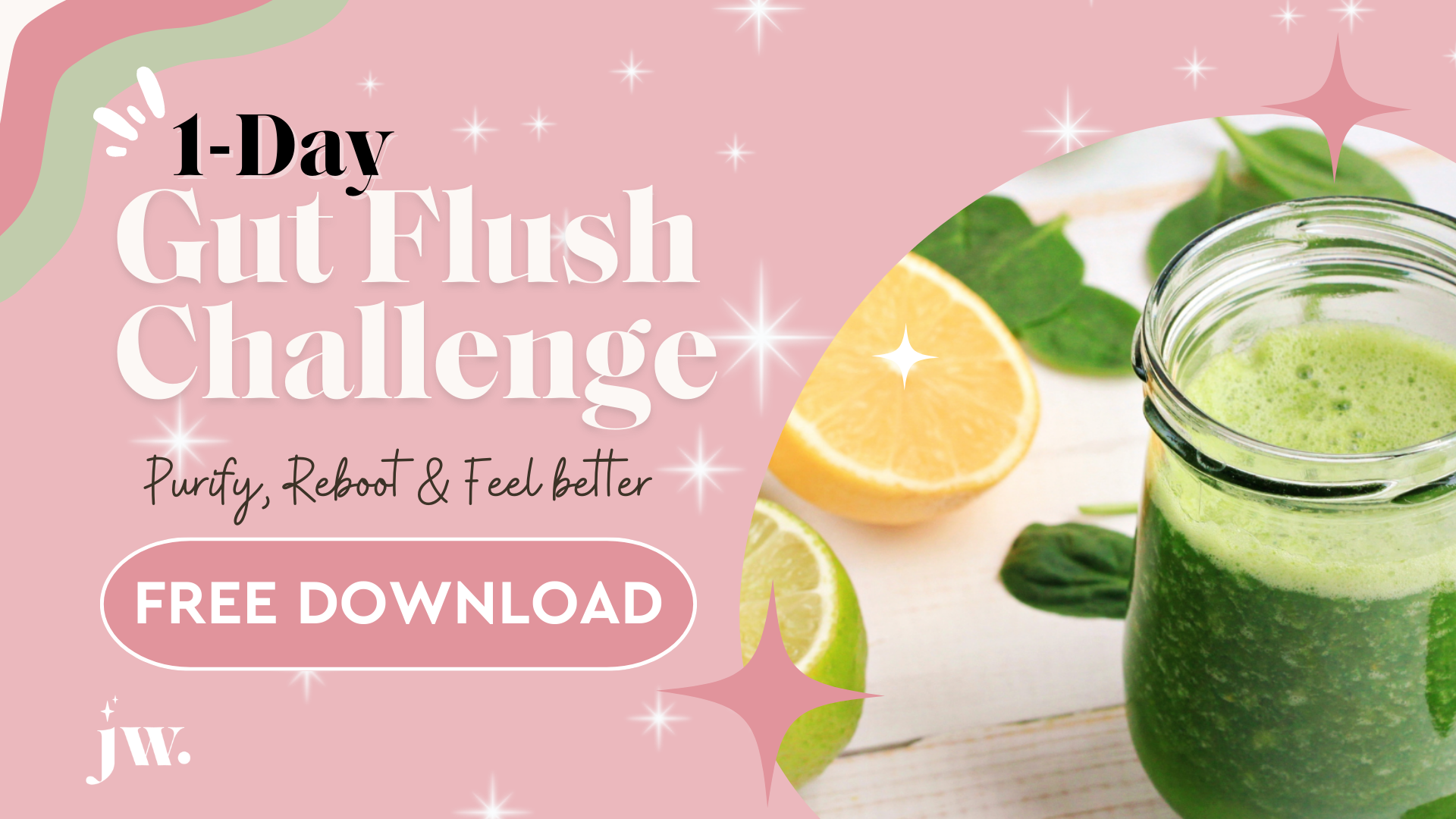Do you frequently feel sluggish or bloated? – or suffer from constipation? Your digestive health might be the issue! It is no surprise that our overall health is strongly influenced by the health of our gut. And gut cleansing is an effective method for resolving typical digestive problems and enhancing your overall health.
This comprehensive guide to gut cleansing that I made just for you contains all the information you need to get started. If you’re ready to learn how to clean your stomach and intestines naturally and take control of your gut health, I’ve got you covered! – covering everything from the advantages of performing a gut cleanse to a step-by-step procedure on how to detox your gut.
Prepare to bid gut problems farewell and welcome a healthier you!
What is Gut Cleansing?
Gut cleansing, also known as colon cleansing, involves eliminating toxins and promoting healthy gut bacteria through the use of natural therapies or dietary changes. It is a practice that helps to improve gut health by removing toxins and promoting the growth of healthy gut bacteria.
Why cleanse your gut– you asked? The goal of gut cleansing is to improve gut health by removing harmful toxins, debris, and waste from the colon, which can lead to a range of health problems if left unchecked.
The Benefits of Gut Cleansing
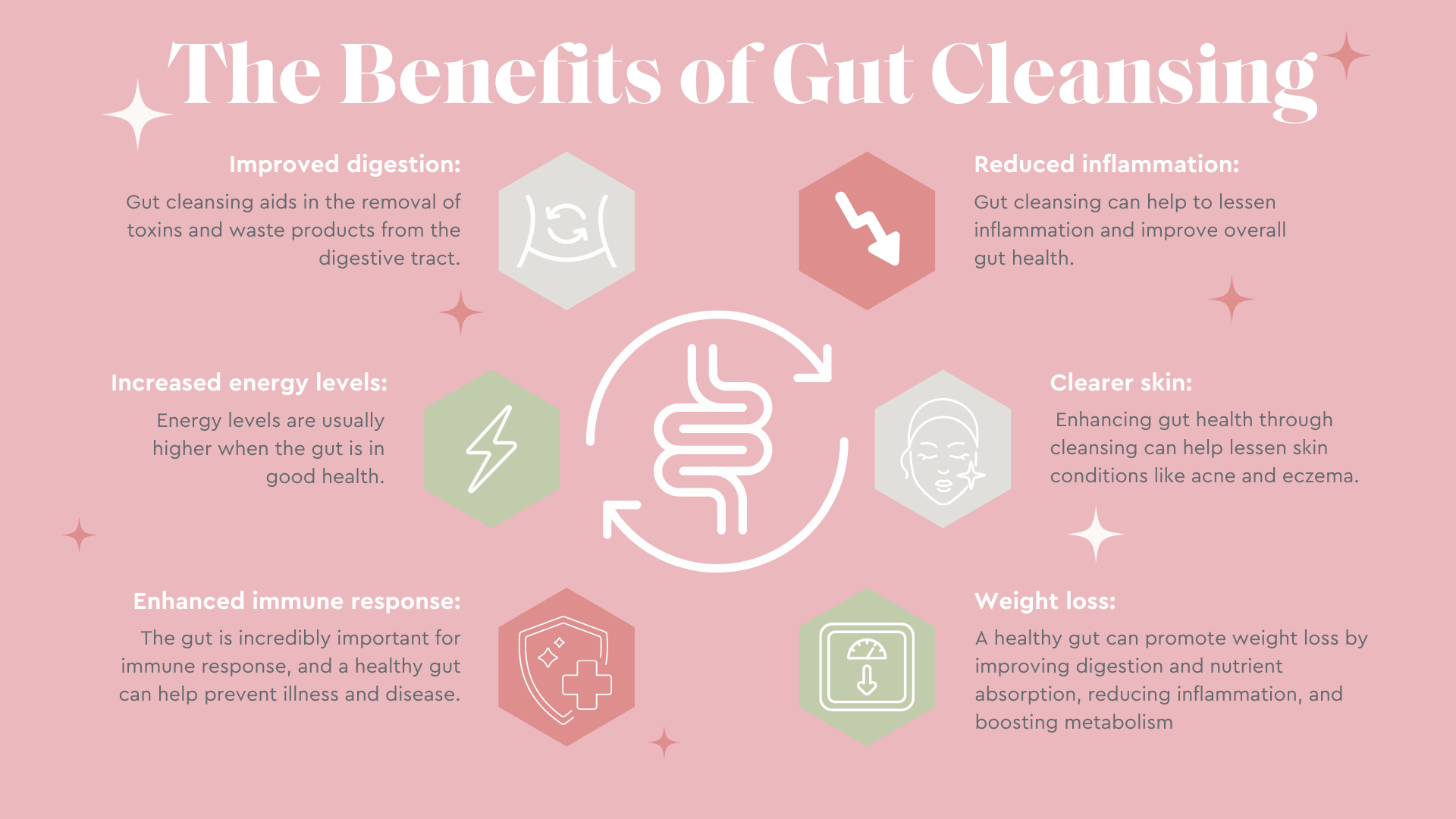
Gut cleansing provides a variety of health benefits that can improve overall health and wellbeing. During this process, you essentially flush toxins in your body, and give it a good gut detox.
Let’s look at some of the most notable benefits of gut cleansing:
- Improved digestion: Gut cleansing aids in the removal of toxins and waste products from the digestive tract, which improves digestion and encourages regular bowel movements.
- Increased energy levels: Energy levels are usually higher when the gut is in good health because the body can absorb and use nutrients from food more effectively.
- Enhanced immune response: The gut is incredibly important for immune response, and a healthy gut can help prevent illness and disease.
- Reduced inflammation: Inflammation in the gut is a common cause of digestive problems, and gut cleansing can help to lessen inflammation and improve overall gut health.
- Clearer skin: Since gut health and skin health are intertwined, enhancing gut health through cleansing can help lessen skin conditions like acne and eczema.
Weight loss: A healthy gut can promote weight loss by improving digestion and nutrient absorption, reducing inflammation, and boosting metabolism.
Different Types of Gut Cleansing
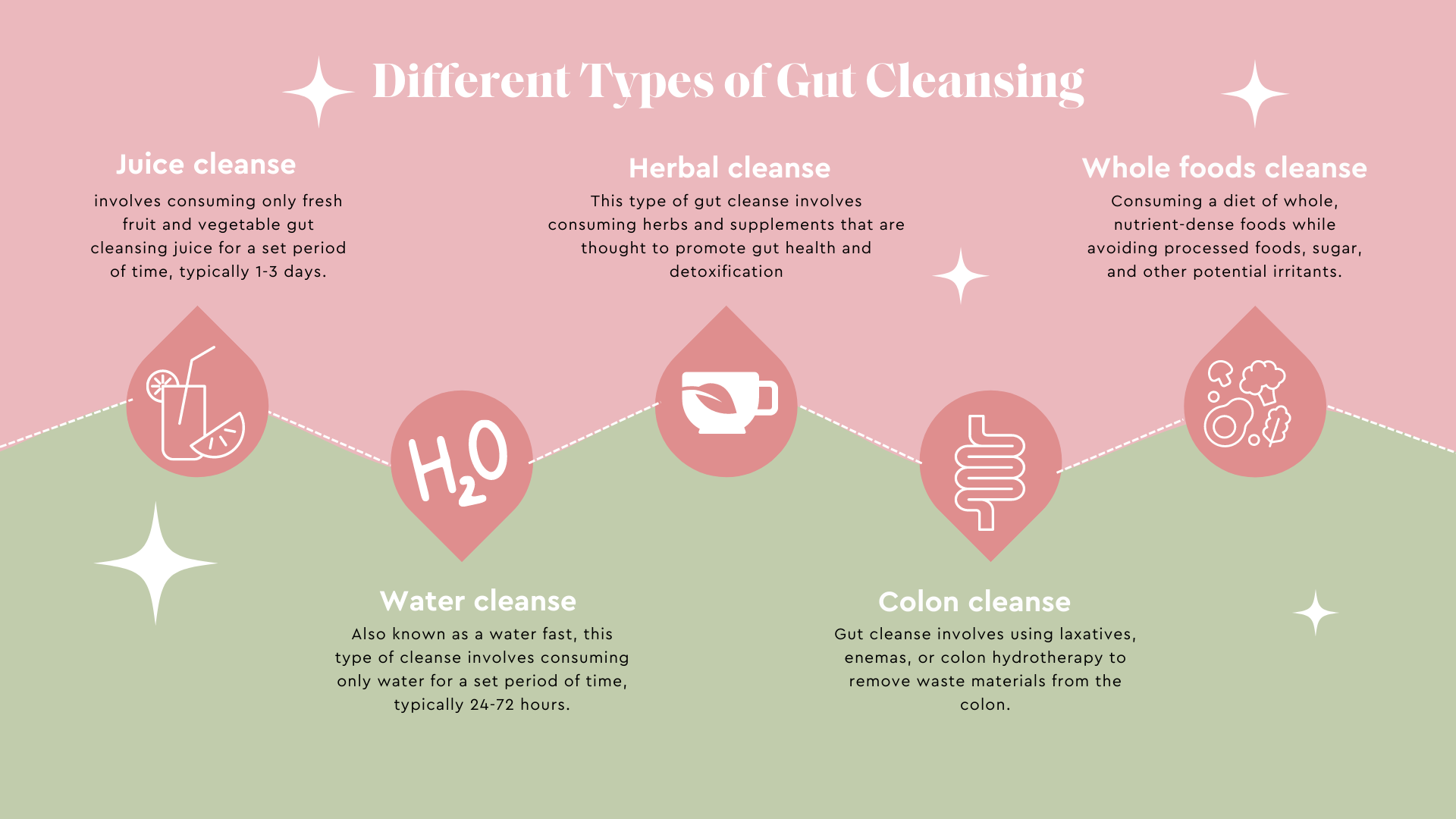
There are several types of gut cleansing, each with its own unique approach and benefits. Here are the most common types of gut cleansing:
- Juice cleanse: This type of gut cleanse involves consuming only fresh fruit and vegetable gut cleansing juice for a set period of time, typically 1-3 days. The idea is to flood the body with nutrients while giving the digestive system a break from solid food. *I do NOT recommend this for those avoiding sugar or with blood sugar issues.
- Water cleanse: Also known as a water fast, this type of cleanse involves consuming only water for a set period of time, typically 24-72 hours. This allows the digestive system to rest and promotes detoxification. *This type of fast should ONLY be considered by experienced fasters, and not for women with major hormonal imbalances.
- Herbal cleanse: This type of gut cleanse involves consuming herbs and supplements that are thought to promote gut health and detoxification. This natural colon cleanse may include milk thistle, dandelion root, and burdock root.
If you’re interested in trying this out with high quality grade supplements to restore digestive function to heal and seal the lining of your gut, try my Gut Rescue Package!
- Colon cleanse: This type of gut cleanse involves using laxatives, enemas, or colon hydrotherapy to remove waste materials from the colon. This can help to promote regular bowel movements and remove toxins from the body, however should only ever be considered very short term. Prolonged use of laxatives can damage the bowel.
- Whole foods cleanse: *PREFERRED METHOD*
This type of gut cleanse involves consuming a diet of whole, nutrient-dense foods while avoiding processed foods, sugar, and other potential irritants. This approach can be less extreme than some of the other types of cleanses and may be more sustainable for some individuals. So, if you want to do your cleansing right and have a process that is tailor-fitted to you, you can try this revolutionary Gut Course!
Prepare: How to Cleanse Your Gut
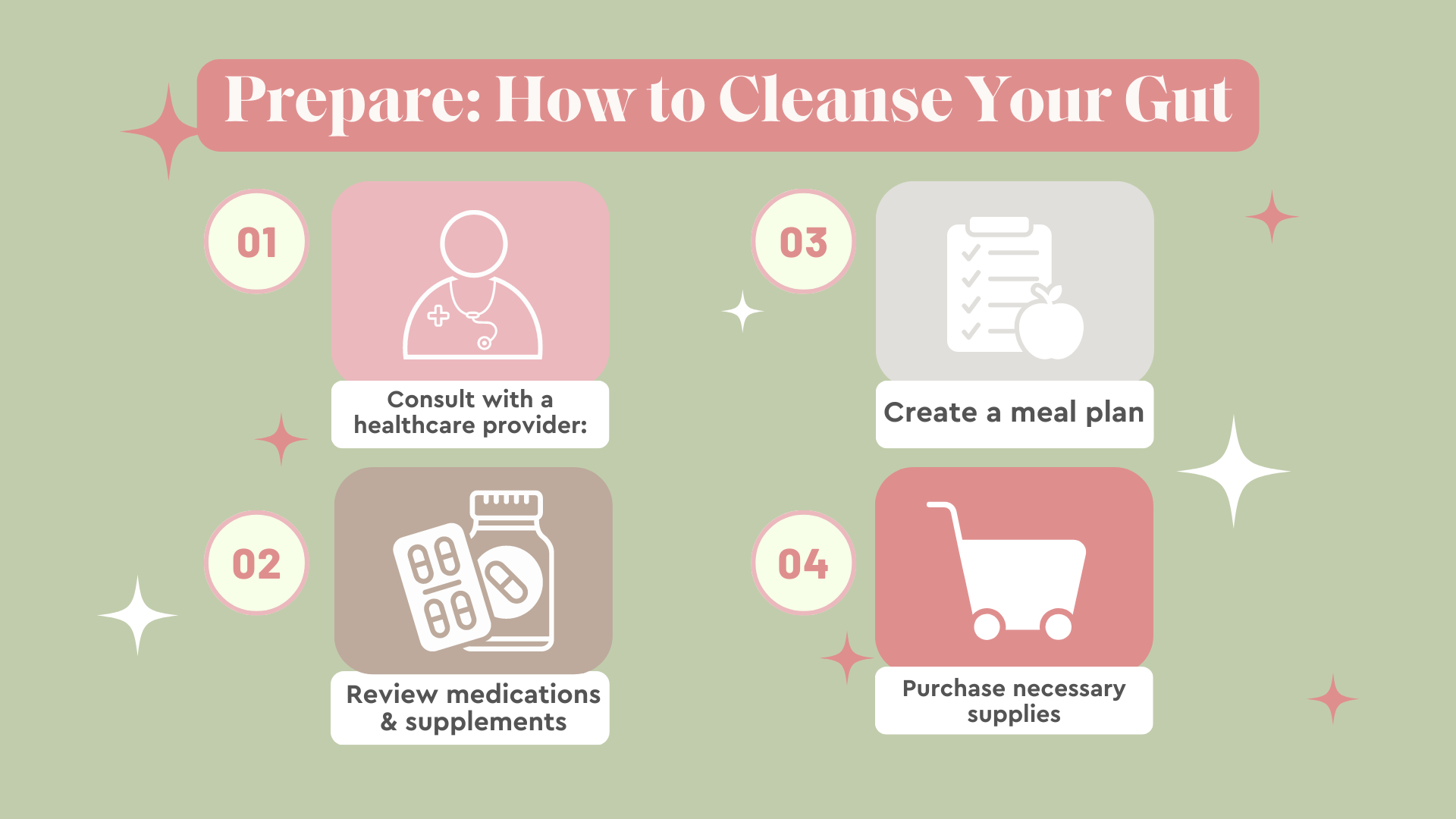
An essential step in making sure a gut cleanse is both secure and efficient is preparation for it. It’s crucial to consider your unique health requirements, preferences, and any existing medical conditions or prescription medications before beginning a gut cleanse.
Here are some of the ways to prepare effectively for your gut cleanse:
- Consult with a healthcare provider: If you have any major medical conditions, it’s important to talk to a healthcare provider before beginning a gut cleanse, particularly if you are taking medications. Your healthcare provider can advise you on whether a gut cleanse is safe for you and offer guidance on the best approach.
- Review medications and supplements: Certain medications and supplements can interfere with a gut cleanse, so it’s important to review your medications and supplements with your healthcare provider before beginning a cleanse. Some medications may need to be temporarily discontinued or adjusted during the cleanse.
- Create a meal plan: Depending on the type of gut cleanse you choose, you may need to modify your diet. Creating a meal plan ahead of time can help you stay on track and ensure that you have the necessary foods on hand. If you’re not sure what to include in your meal plan, consider consulting with a nutritionist or dietitian.
- Purchase necessary supplies: Depending on the type of gut cleanse you choose, you may need to purchase certain supplies, such as a juicer for a juice cleanse or an enema kit for a colon cleanse. Make sure you have everything you need before beginning the cleanse.
Looking for a way to start your journey to gut cleansing? I got you!
Give your digestive system a much-needed reboot
Foods to Eat During a Gut Cleanse
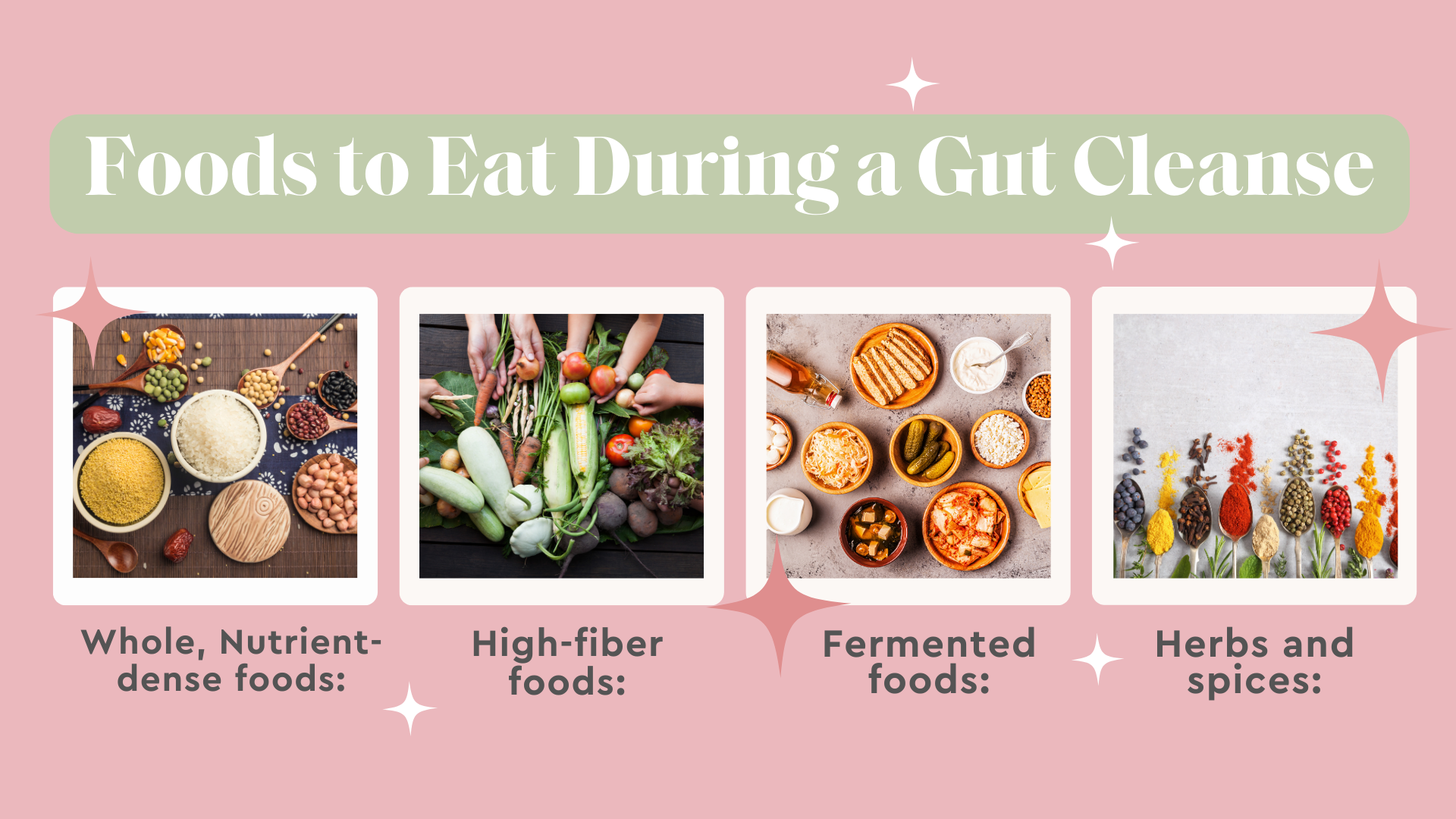
You should eat whole, nutrient-rich foods that support healthy gut flora while on a gut cleanse. Fruits, vegetables, and certain types of nuts and seeds are high in fibre and help to promote regular bowel movements and aid in toxin removal.
What foods help flush out your system? Here are some foods to consider including to your gut cleanse diet:
- Whole, nutrient-dense foods: Fresh fruits and vegetables, nuts, seeds and some legumes are all great choices for a gut cleanse. These foods are rich in fibre, vitamins, minerals, and antioxidants, which help support healthy digestion and a healthy gut microbiome.
- High-fiber foods: Fiber helps promote healthy bowel movements and supports the growth of beneficial gut bacteria. Some high-fiber foods to consider during a gut cleanse include chia seeds, flaxseeds, psyllium husk, and fruits and vegetables like berries, broccoli, and sweet potatoes.
- Fermented foods: Fermented foods like sauerkraut, kimchi, kefir, and kombucha are rich in probiotics, which help support a healthy gut microbiome. Probiotics are beneficial bacteria that can help improve digestion, boost immune function, and reduce inflammation.
- Herbs and spices: Certain herbs and spices have been shown to have anti-inflammatory and antioxidant properties, which can help support gut health. Some examples include ginger, turmeric, cinnamon, and garlic.
By including these types of foods into your diet throughout a gut cleanse, you can help support good digestion, reduce inflammation, and maintain a healthy gut flora. Do keep in mind that the precise foods you consume will depend on the gut cleanse method you select.
Foods to Avoid During a Gut Cleanse
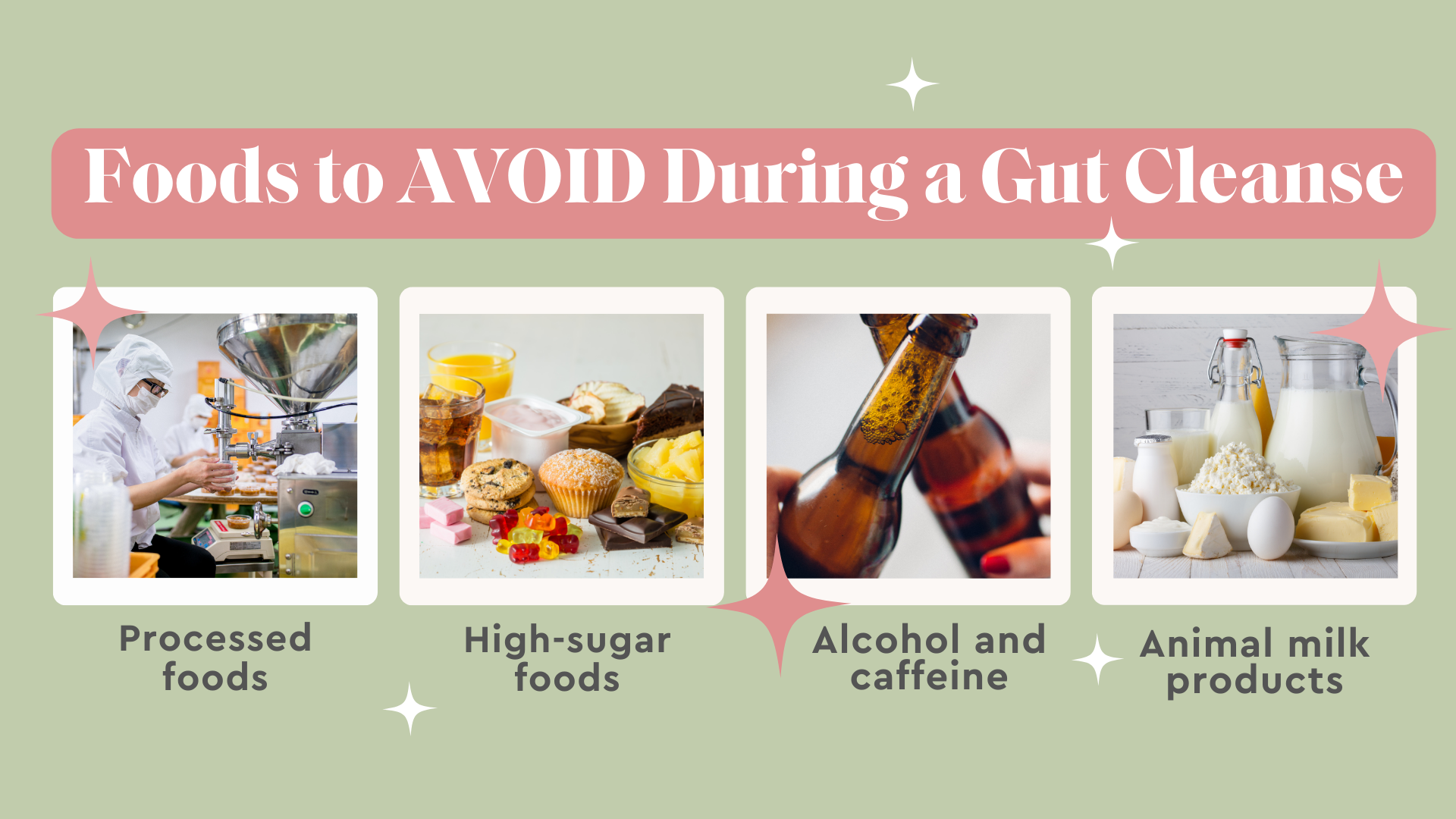
If you want to be successful in your gut cleanse journey, processed foods, high-sugar foods, alcohol, and caffeine should be avoided during a gut cleanse. These foods can promote inflammation and disrupt healthy gut bacteria balance. Animal milks like dairy should also be avoided, as they can be difficult to digest and can contribute to the buildup of toxins in the body.
Here are some types of foods to consider avoiding during a gut cleanse:
- Processed foods: Processed foods, including packaged snacks and meals, often contain added sugars, artificial ingredients, and unhealthy fats that can be difficult for the body to digest and may contribute to inflammation.
- High-sugar foods: Consuming high amounts of sugar can disrupt the balance of beneficial bacteria in the gut, leading to digestive issues and inflammation. Foods to avoid include sugary drinks, candy, and baked goods.
- Alcohol and caffeine: Both alcohol and caffeine can irritate the gut lining and disrupt the balance of gut bacteria. It’s best to avoid these during a gut cleanse, or limit consumption to moderate amounts.
- Animal milk products: Some animal products, such as dairy, can be hard on the digestive system and promote inflammation. Consider limiting or avoiding these during a gut cleanse.
It’s crucial to remember that the precise foods to stay away from may change depending on the gut cleanse method you select as well as your personal health requirements and preferences.
How to Perform a Gut Cleanse
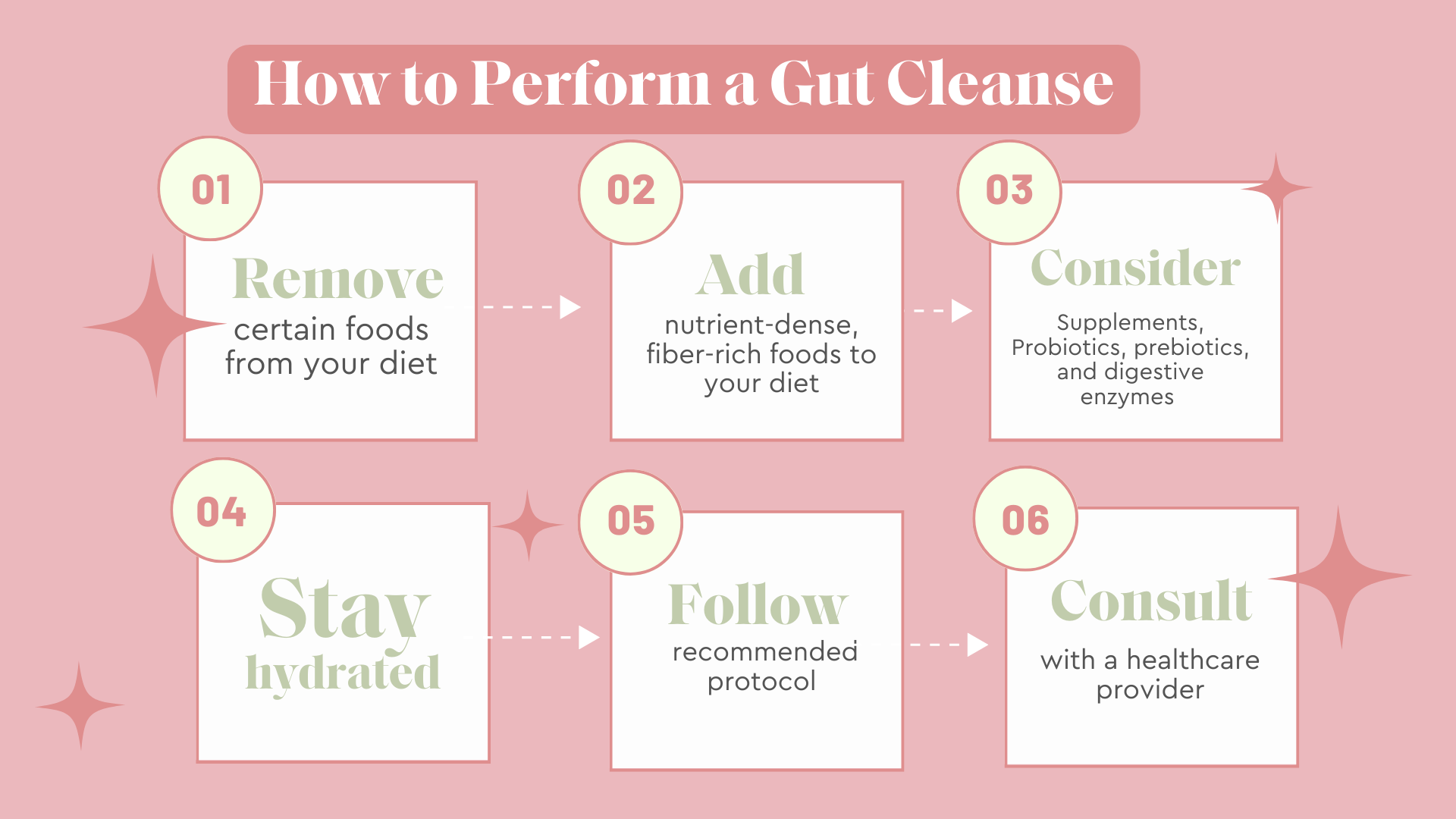
There are different methods of gut cleansing, including juice cleanses, colon cleanses, and food-based cleanses.
A food-based cleanse is a recommended approach for beginners. It involves consuming whole, nutrient-dense foods while avoiding processed foods and other foods that can disrupt gut health. Performing a gut cleanse typically involves the following steps:
- Remove certain foods from your diet: This may include processed foods, high-sugar foods, alcohol, caffeine, and animal milks.
- Add nutrient-dense, fiber-rich foods to your diet: Focus on whole foods such as vegetables, fruits, nuts and seeds.
- Consider supplements: Probiotics, prebiotics, and digestive enzymes may be helpful in supporting gut health during a cleanse.
- Stay hydrated: Drinking plenty of water and herbal teas can help support the digestive system and flush out toxins.
- Follow the recommended protocol: The specific protocol for a gut cleanse may vary depending on the type of cleanse being performed. It’s important to follow the recommended steps and timing for optimal results.
- Consult with a healthcare provider: It’s always a good idea to consult with a healthcare provider or nutritionist before starting a gut cleanse, especially if you have any underlying health conditions or are taking medications.
After completing a gut cleanse, it is important to slowly reintroduce foods back into the diet. Maintaining a healthy diet, regular exercise, and hydration are also important for maintaining a healthy gut. Follow-up with a healthcare provider is also recommended to ensure that gut health has improved and to address any ongoing concerns.
Final Thoughts
Gut cleansing can enhance health and wellbeing. Follow the guide for optimal results, including preparation, safe cleansing, and aftercare. Dedication and commitment can make gut cleansing a helpful step towards better health. Overall, gut cleansing can provide a wide range of benefits that can improve physical and mental health, making it a worthwhile practice for many individuals.
Review medications and supplements for any that may need to be temporarily stopped. Plan meals with whole, nutrient-dense foods and gather necessary supplies before starting the cleanse. Be sure to consult a healthcare provider prior to starting a gut cleanse to ensure safety and appropriateness. If you don’t have one yet, you can always consult with me! Better yet, Become a JW Health Superstar Member and Join my nutrition coaching. Let me be your new best friend in health!
Frequently Asked Questions
1. What is the best time of year to perform a gut cleanse?
There is no one “best” time of year to perform a gut cleanse. Any time of year is appropriate for a gut cleansing diet. The decision to perform a gut cleanse should be based on individual health goals and needs, and should be done under the guidance of a healthcare professional.
2. Can gut cleansing be harmful?
Gut cleansing can be harmful if not done properly. Improper cleansing methods or overuse of cleansing products can disrupt the natural balance of bacteria in the gut, leading to digestive issues, nutrient deficiencies, dehydration, and other health problems. It is important to consult with a healthcare professional before attempting a gut cleanse to ensure it is safe and appropriate for your individual needs.
3. How long should you do a gut cleanse?
The length of a gut cleanse can vary depending on individual health goals and needs, as well as the specific cleanse method being used. Some gut cleanses may last for a few days, while others may span several weeks. It is important to follow the instructions provided by a healthcare professional or the cleanse product manufacturer, and to stop the cleanse if any adverse effects are experienced.
4. What are some signs that a gut cleanse is working?
Some possible signs that a gut cleanse is working include improved digestion, reduced bloating and gas, more regular bowel movements, clearer skin, improved energy levels, and better overall mood. However, it is important to note that everyone’s response to a gut cleanse can be different, and some people may not notice significant changes. The effectiveness of a gut cleanse should ultimately be assessed by a healthcare professional.
5. How do I detox my gut?
You can detox your gut using a variety of methods, such as dietary modifications, probiotics, and herbal supplements. Before beginning a gut detox, it’s crucial to speak with a healthcare provider to be sure it’s secure and suitable for your particular requirements.
6. How do you detox and reset your gut?
Detoxing and resetting your gut can involve various methods, including dietary changes, probiotics, and certain supplements. It is important to work with a healthcare professional to develop a personalized plan that meets your specific needs and health goals.
7. How can I clean my gut in one day?
If you’re wondering how to clean your stomach in one day, you should realize that it is not possible because gut health is a long-term process that calls for regular work. But, implementing short-term dietary modifications, drinking enough of water, and exercising can all enhance gut health.
8. How do you know if you need a gut cleanse?
In addition to skin problems, exhaustion, and mood swings, signs that you might need a gut cleansing include digestive problems including bloating, gas, and irregular bowel movements. But, it’s crucial to speak with a medical expert to ascertain whether a gut cleanse is required and suitable for your particular circumstances.
Related Articles
- 10 Unhealthy Gut Symptoms
- Healthy Eating – What’s The FIRST Step?
- Things Your Gut Loves
- The Pill is Not the Answer
- Why Eat Clean?



